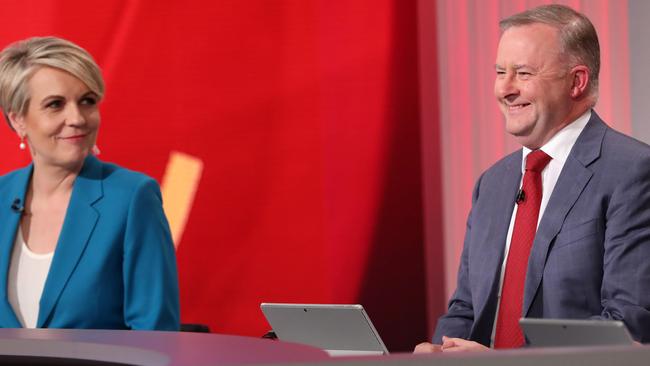Anthony Albanese set to run for ALP leadership contest as Tanya Plibersek kicks it off
Anthony Albanese set to declare that he will run for the Labor leadership and to promise to drop controversial tax reforms.

Anthony Albanese is set to declare that he will run for the Labor leadership and to promise to drop Bill Shorten’s controversial tax reforms
Mr Albanese, a former deputy prime minister and runner-up in the last Labor leadership contest, is expected to be the second NSW Labor Left figure to run alongside ALP deputy leader Tanya Plibersek.
Earlier, Ms Plibersek kicked off the contest to replace Bill Shorten, in an ALP leadership race without a clear Right candidate and two major Left figures set to face off.
Ms Plibersek this morning confirmed she is considering a run but will not commit yet.
The contest - which will be decided by both Labor MPs and ALP members - could chart the course for the devastated Opposition, with Ms Plibersek reluctant this morning to shift on Labor’s controversial tax reform and big spending election policies.
“I’m certainly considering it. I mean my determination is to ensure that we’re in the best place to win in three years’ time, that we continue the discipline and the unity that we’ve shown in the last six years, and that we continue to offer Australians real options,” she told ABC News.
“I’ll talk to my colleagues today but, of course, I’m considering it.
“I have loved campaigning in this election campaign. I have loved campaigning with our loyal and dedicated party members.
“We have an obligation as Labor Party people to keep fighting for a fairer Australia, for a strong economy and a fair society. We’ll keep doing that.”
Deputy Opposition Leader @tanya_plibersek tells @barriecassidy she is "certainly considering" putting her hand up for the Labor leadership.#Insiders #auspol #AusVotes pic.twitter.com/KYnMaam6mN
— Insiders ABC (@InsidersABC) May 18, 2019
If she won the leadership, Ms Plibersek would Labor’s second female leader and the first female federal opposition leader.
Mr Albanese is expected to announce his intentions later this morning. The former deputy prime minister won a ballot of the Labor membership in 2013, but was beaten by Mr Shorten on the back on MPs’ support.
Labor Right figures reported as possible contenders include opposition treasury spokesman Chris Bowen, finance spokesman Jim Chalmers and defence spokesman Richard Marles.
Albo in pole position
Last night, in the lead-up to Mr Shorten’s concession speech, Mr Albanese said the whole Labor team had worked incredibly hard during the campaign.
“As part of that team I must accept, as we must collectively, responsibility for the fact that the many people who rely upon us will be disappointed that the outcome tonight is uncertain,” he said.
“But what I am absolutely convinced about, and have been convinced about since I joined our great party when I was still at school, is that this movement is much bigger than any individual.”
He didn’t shy away from Labor’s “redistributive agenda” of closing tax loopholes, properly funding schools and hospitals, taking action on climate change, advancing indigenous reconciliation and removing discrimination.
“The internal Labor values that you have fought for each and every day of this campaign are ones that I’m incredibly proud of,” he said.
“One of the things that we need to be clear about in the discussion that will take place now over coming days is that the Labor Party doesn’t seek to form government to change who sits in ministerial cars.
“We seek to form government to change the country and we shouldn’t be shy about that.” He said the coalition relied upon a scare campaign but that ultimately hope was greater than fear.
“But it’s also up to every one of us — every one of us — to remain firm in our commitments.”
Mr Albanese also noted to supporters that he boosted his personal primary vote in Grayndler to more than 50 per cent, even while he visited more than 60 other electorates during the campaign.
How Labor elects a new leader
Nominations open at a parliamentary party meeting (caucus), and remain open for a week.
- Need to get support of 20 per cent of caucus to get nominated - If there is only one nomination there is no ballot - If there are two or more nominations there is a ballot of both the parliamentary party and grassroots members - Ballot is open to all financial members of the party, with no restrictions on time served.
- Each of the two voting blocs is weighted equally in determining the winner. That is, 50 per cent each. Last time Anthony Albanese won the grassroots vote but didn’t get enough caucus votes and Bill Shorten won.
- The organisational ballot takes 20 days - During the ballot process the two candidates can campaign and debate each other - It is expected there would be a candidate from Right and Left factions - About 30,400 members voted in 2013 - Once the postal ballot is over, the caucus votes.
- An interim leader is appointed. Chris Bowen held that position last time - In 2013, the timeframe was: nominations opened September 13 and the caucus voted October 10
With AAP




To join the conversation, please log in. Don't have an account? Register
Join the conversation, you are commenting as Logout